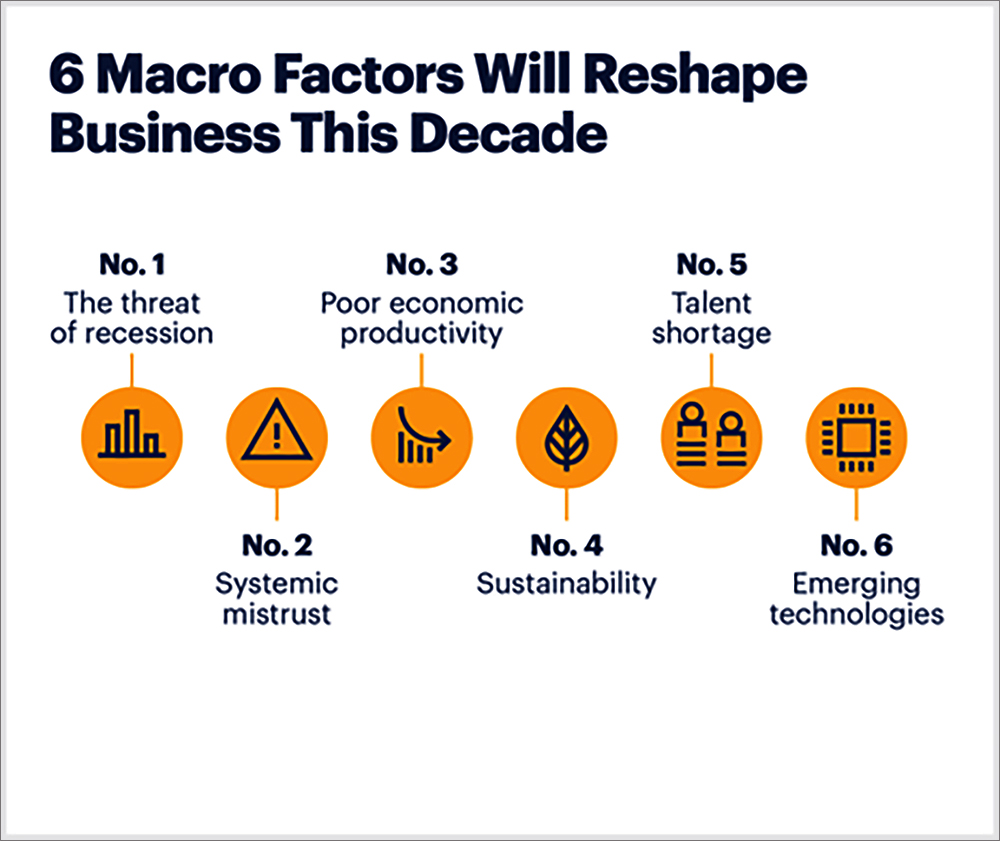Executives will continue to grapple with challenges during the 2020s, but from the maelstrom new business opportunities will arise says Mark Raskino at Gartner.
A decade-long boom, generated substantially from inexpensive finance and lower-cost energy, led to structural stresses such as highly leveraged debt, crumbling international alliances and bubble-like asset prices. We were overdue for a reckoning.
The pandemic coincided with and catalysed societal shifts, spurring a strategy reset for many industries. Executive leaders must acknowledge these six changes to reconsider how business will get done.

#1 Threat of recession
Although the pandemic was the visible impetus for the economic volatility we have seen the last several years, the reality is that the markets were already fragile and precarious.
What we have found, though, is that actions you take now are critical to your success during a downturn and beyond. The most important? Decisions around the way you allocate resources and invest in growth. Success requires early, decisive action by every function in the organisation to manage spend, secure talent and accelerate digital.
#2 Systemic mistrust
Even before the events of 2020, global consumer and citizen trust was at an all-time low. Now, the ripple effects, such as supply chain and talent shortages, and overall brand mistrust demand a relentless focus on customer value.
Executives must continue to consider whether consumers will remain loyal to legacy brands or take their business to those that provide the experience they want or have limited goods in stock. Often building a more tailored and personalised connection to the individual’s needs can help overcome consumer distrust and frustration.

#3 Poor productivity
The digitalisation of work, coupled with the adoption of hybrid and remote work practices, has created a renewed focus on the fundamentals of workplace productivity. Once detached executives are starting to peer down through delegation layers and into the details to find out-of-date technologies, bureaucratised practices and process inefficiencies.
The reality is, employees are being asked to do more with less when they least have the capacity to do so. They can only make so many improvements in productivity and effectiveness, especially as organisations shift in response to rapidly changing conditions, when they’re confined to the same old processes and workflows.
You must rethink how work gets done and who does it to enable responses to disruptions and change. Failure to re-evaluate these fundamentals will exhaust already taxed employees and make them less willing and able to stay engaged, while being productive through this crisis — and the next.
#4 Sustainability
Now that it is not overshadowed by the pandemic, sustainability is once again a mainstream concern for CEOs.
In the 2022 Gartner CEO and Senior Business Executive Survey, we surveyed more than 400 senior business leaders about their 2022-23 priorities. Environmental issues came in ninth, with 9% of respondents citing it as a top-three priority.
That may be a relatively small portion, but this is the first time the category has ever cracked the top 10 and reflects a very significant increase in interest. It was in 14th position just three years ago and 20th position seven years ago. Business leaders are now under pressure from customers, investors, regulators, and employees to do more on environmental sustainability, and having a sustainable business is seen as an opportunity to drive efficiency and revenue growth.
#5 Talent shortage
Organisations find themselves with a unique challenge. Keeping the in-demand talent they have and finding the competitive talent they need, especially when staff budgets are contracting or staying flat. Fighting for new headcount will be challenging, so organisations will have to get creative.
To combat the tricky combination of an economic slowdown and the talent market squeeze, the best leaders will enact creative methods to acquire new skills and capabilities without hiring new full-time employees.
#6 Emerging technologies
Emerging technologies will have a large, disruptive effect in the coming decade. Adaptive AI, the metaverse, platform engineering, sustainable technology and superapps will change how organisations and societies operate. Seismic change does not happen overnight, but ignoring a disruption in its early stages typically makes the entry price higher later.
To capture the opportunities, it is critical to understand what, when and how key technologies will impact your strategic ambitions in the coming years.
In summary
- The pandemic is a human crisis that disrupted all business plans, but it was not a solo threat.
- The pandemic was a catalyst to a number of other macro factors to come to the foreground, like systemic mistrust and poor economic productivity.
- In combination, these factors require strategy resets for many industries, which will reshape business deep into the 2020s.


